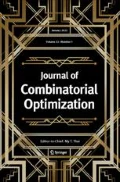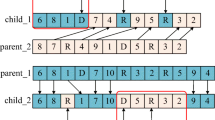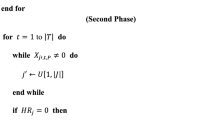Abstract
In this paper, we apply a scheduling model to address the single day surgery scheduling problem for single operating room (OR). The OR operational cost and patients’ satisfaction need to be balanced. We optimize the scheduling of surgeries with two priority levels in an integrated manner, given the OR is off-duty for a fixed period. Surgeon’s accumulated tiredness during working hours, and controllable surgery durations are modeled. After deriving the NP-hardness of the problem, we first solve optimally two special cases in pseudo-polynomial time, and then design a hybrid evolutionary multi-objective algorithm for the general case. Iterated local search is embedded into the elitist non-dominated sorting genetic algorithm (NSGA-II) framework, and Pareto optimal property is utilized to guide evolution towards promising areas in solution space. Finally computational studies with data from a hospital in P.R. China are performed to verify the value of algorithm hybridization against the commercial solver and original NSGA-II, and to verify the value of integrated optimization against sequential decision-making.



Similar content being viewed by others
References
Adiri I, Bruno J, Frostig E, Kan A (1989) Single-machine flow-time scheduling with a single breakdown. Acta Inform 26:679–685
Batun S, Denton BT, Huschka TR, Schaefer AJ (2011) Operating room pooling and parallel surgery processing under uncertainty. Informs J Comput 23:220–237
Cardoen B, Demeulemeester E, Belien J (2009a) Sequencing surgical cases in a day-care environment: an exact branch-and-price approach. Comput Oper Res 36:2660–2669
Cardoen B, Demeulemeester E, Belien J (2009b) Optimizing a multiple objective surgical case sequencing problem. Int J Prod Econ 119:354–366
Cardoen B, Demeulemeester E, Belien J (2010) Operating room planning and scheduling: a literature review. Eur J Oper Res 201:921–932
Crepinsek M, Liu S, Mernik M (2013) Exploration and exploitation in evolutionary algorithms. ACM Comput Surv 45:1–33
Deb K, Pratap A, Agarwal S, Meyarivan T (2002) A fast and elitist multiobjective genetic algorithm: NSGA-II. IEEE T Evol Comput 6:182–197
He Y, Sun L (2015) One-machine scheduling problems with deteriorating jobs and position-dependent learning effects under group technology considerations. Int J Syst Sci 46:1319–1326
Jaradat G, Ayob M, Ahmad Z (2014) On the performance of Scatter Search for post-enrolment course timetabling problems. J Comb Optim 27:417–439
Jebali A, Hadj Alouane AB, Ladet P (2006) Operating rooms scheduling. Int J Prod Econ 99:52–62
Ji M, Hsu C, Yang D (2013) Single-machine scheduling with deteriorating jobs and aging effects under an optional maintenance activity consideration. J Comb Optim 26:437–447
Kacem I, Kellerer H, Lanuel Y (2013) Approximation algorithms for maximizing the weighted number of early jobs on a single machine with non-availability intervals. J Comb Optim 27:417–439. doi:10.1007/s10878-013-9643-7
Lee CY, Lin CS (2001) Single-machine scheduling with maintenance and repair rate-modifying activities. Eur J Oper Res 135:493–513
Lim D, Jin YC, Ong YS, Sendhoff B (2010) Generalizing surrogate-assisted evolutionary computation. IEEE Trans Evol Comput 14:329–355
Pan Q, Ruiz R (2012) Local search methods for the flowshop scheduling problem with flowtime minimization. Eur J Oper Res 222:31–43
Rahimi-Vahed AR, Mirghorbani SM (2007) A multi-objective particle swarm for a flow shop scheduling problem. J Comb Optim 13:79–102
Vickson RG (1980) Two single machine sequencing problems involving controllable job processing times. AIIE Trans 12:258–262
Yu S (2014) An optimal single-machine scheduling with linear deterioration rate and rate-modifying activities. J Comb Optim. doi:10.1007/s10878-014-9739-8
Zhong L, Luo S, Wu L, Xu L, Yang J, Tang G (2014) A two-stage approach for surgery scheduling. J Comb Optim 27:545–556
Zhou A, Jin YC, Zhang Q (2014) A population prediction strategy for evolutionary dynamic multiobjective optimization. IEEE Trans Cybern 44:40–53
Acknowledgments
We gratefully thank the anonymous referees for their helpful comments on the earlier versions of our paper. This research was supported by the National Natural Science Foundation of China (Grant Nos. 7141001024, 71271039, 91024029), and the Program for New Century Excellent Talents in University under Grant No. NCET-10-0218.
Author information
Authors and Affiliations
Corresponding author
Appendix
Appendix
In the above formulation, \(M\) is a very large positive number, and decision variable notations are introduced as follows: \(s_i\) is the earliest starting time of job \(J_i\), \(C_i\) is the completion time of job \(J_i\), \(u_i\) is the resource allocation for job \(J_i\), \(x_{ij}\) equals 1 if job \(J_i\) is scheduled before job \(J_j\) and 0 otherwise, and \(y_i\) equals 1 if job \(J_i\) is scheduled before \(t_1\) and 0 otherwise. \(f^{(1)*}\) is the minimum value of schedule performance.
Rights and permissions
About this article
Cite this article
Wang, D., Liu, F., Yin, Y. et al. Prioritized surgery scheduling in face of surgeon tiredness and fixed off-duty period. J Comb Optim 30, 967–981 (2015). https://doi.org/10.1007/s10878-015-9846-1
Published:
Issue Date:
DOI: https://doi.org/10.1007/s10878-015-9846-1




